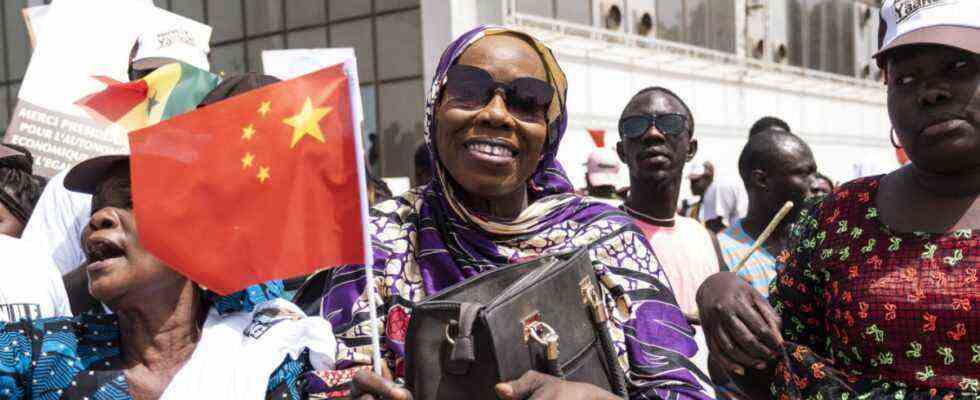Hundreds of people line the streets of Dakar in July 2018, applauding and waving Chinese flags. On his state visit to the Senegalese capital, Xi Jinping received what he rarely gets in Europe: admiration. The Chinese President visits a school, a hospital and a museum with his entourage. These are projects financed or built by Chinese companies.
A high-profile event takes place in sports. Xi Jinping opens the new national wrestling stadium with Senegalese President Macky Sall, built in 28 months by Chinese companies. “Stadiums are important landmarks for many states. Shops and districts can develop around them,” says Ding Guanghui of Beijing University of Engineering and Architecture. “But the Chinese government is also pursuing political goals with such buildings.”
Senegal has maintained diplomatic relations with Taiwan since 1995, and the island nation is viewed as a breakaway region by the People’s Republic. Beijing increased the pressure and announced investments, including in sports. In 2005, Senegal broke away from Taiwan and established relations with Beijing. Since then, the trade volume between the two countries has grown from 175 million euros to 2.2 billion euros per year. With Xi Jinping’s visit, Dakar has come to symbolize a development that researchers like Ding Guanghui call “stadium diplomacy.” China has built more than a hundred arenas in developing countries, two-thirds of which are in Africa. But do these buildings actually contribute to development?
Football suggests the opposite. Chinese companies built a number of stadiums for hosts of past African Cups. Whether Ghana or Angola, Gabon or Equatorial Guinea: Beijing granted cheap and long-term loans. And in return secured access to rare earths and raw materials such as oil, copper and cobalt. The People’s Republic is now one of the most important trading partners in the countries mentioned. “China wants to create structural dependencies,” says Simon Chadwick of the Center for the Eurasian Sports Industry. “In Africa, Beijing encounters fewer restrictions than in Europe. And the local regimes can present themselves as generous and close to the people with new stadiums.”
Cameroon’s media says nothing about corruption and deaths
It is regimes that are often criticized for corruption and human rights violations. This also applies to Cameroon, currently hosting the 33rd Africa Cup. The Central African state has been autocratically ruled for 40 years by Paul Biya, who will soon be celebrating his 89th birthday. His Francophone government has long fought Anglophone separatists in the west of the country. Around 4,000 people are said to have been killed and 700,000 are on the run. In the censored media of Cameroon there is little information about attacks and dangers for the Africa Cup. Instead: messages of departure, cohesion and powerful friends from the Far East.
Built with Chinese money: The teams from Senegal (Keita Balde left) and Zimbabwe (Gerald Takwara) duel at the 33rd Africa Cup of Nations in the Stade de Kouekong in Bafoussam.
(Photo: Pius Utomi Ekpei/AFP)
Two of the six stadiums at this year’s Africa Cup of Nations were made possible by Chinese companies, in Bafoussam and in Limbe, they are functional buildings for 20,000 spectators each. Local media reports that smaller shops will settle and this could create 5,000 jobs. China’s state news agency Xinhua also dedicated a report to the stadiums, in which Cameroonian regional politician Augustine Awa Fonka also had a say: “Trade relations between China and Cameroon have a great future.” From corruption and excessive construction costs: not a word. Cameroon has significant deposits of oil, iron ore and gold. But the infrastructure for the development is expandable.
China has established a network in Africa and wants to continue it
The People’s Republic could help with the development, its networks on the African continent have been established for decades. During the Cold War in the 1950s, China received economic aid from the Soviet Union under Mao Zedong. Beijing supported socialist governments in Africa for the common cause, sending construction workers and materials for cheap infrastructure, including sports facilities, among other things. In 1964, Prime Minister Zhou Enlai visited ten newly independent African states. Some ceremonies took place in stadiums. In 1971, the People’s Republic joined the United Nations instead of Taiwan – with support from Africa.
However, one cannot speak of an actual construction boom until the 21st century. Chinese companies not only built new stadiums in Africa, but also in Cambodia, Laos, Haiti and El Salvador; in countries devastated by conflict or natural disasters. And Beijing also wants to have an influence beyond construction. In 2019, the Chinese company Huawei introduced the faster 5G mobile communications standard in Egypt, shortly before the start of the Africa Cup there. The Suez Canal east of Cairo is considered essential for the “New Silk Road”. By the middle of the 21st century, China wants to connect dozens of countries in Europe, Asia and Africa: through railway lines, expressways, pipelines and ports.
Sports facilities are also to be built along the trade route: a stadium in Rijeka, Croatia, an indoor swimming pool in Minsk, Belarus, and a project is also being discussed in Trieste, Italy. “It is obvious that China is not invading by force of arms, as some European states did in earlier centuries,” says Matt Ferchen of Leiden University. “But some structures are reminiscent of the colonial past.” In Africa, states often undertake to import Chinese goods, which harms domestic production. Chinese companies often fly workers in and forego training local workers, which can create social tensions.
Probably nobody can put an exact number on how many billions have flowed from Europe to Africa in the past few decades. Despite this, economic performance there has hardly improved. The People’s Republic is taking a different path, but its infrastructure is also not very sustainable, says Charlie Xue from Hong Kong City University. “Maintenance is not good, so sometimes the stadiums are in a sorry state after ten or twenty years.” Nevertheless, more stadiums are being built, for example for the 2023 Africa Cup of Nations in Ivory Coast.

